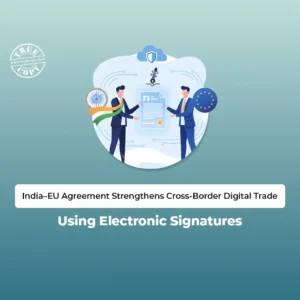Remember the days when signing a business contract meant printing stacks of paper, chasing down executives for wet signatures, then scanning and emailing documents back and forth? Those days are fading fast, thanks to the rise of e-signatures.
Today, businesses of all sizes are embracing electronic signing of contracts to expedite deals, reduce costs, and streamline workflows. But with this shift comes important questions:
- Are e-signatures for corporate agreements legally valid?
- How secure are they compared to traditional signatures?
- What types of corporate documents can you sign online?
In this guide, we’ll answer all these questions—and more—in simple, easy-to-understand language. By the end, you’ll see why e-signature India isn’t just a trend but a game-changer for contemporary businesses.
Why Corporations Are Shifting to E-Signatures
The corporate world is all about efficiency, and e-signatures for corporate agreements deliver exactly that. Here’s why more companies are making the switch:
1. Lightning-Fast Signing Process
No more waiting days (or weeks) for signed contracts to arrive by courier or email. With online contract signing, agreements can be completed in minutes, not days.
2. Huge Cost Savings
Think about all the expenses tied to traditional signing:
- Printing & paper costs
- Courier or postage fees
- Storage for physical documents
- Time wasted chasing signatures
Switching to electronic signatures for corporate contracts eliminates most of these costs.
3. Stronger Security & Fraud Prevention
A common myth is that e-signatures are less secure than handwritten ones. In reality, top e-signature platforms for business (like TRUESigner ONE) use:
- Bank-level encryption to protect documents
- Multi-factor authentication to verify signers
- Detailed audit logs tracking who signed, when, and from where
This makes e-signatures for corporate agreements even more secure than pen-and-paper methods.
4. Perfect for Remote & Hybrid Work
With teams spread across cities (or countries), gathering wet signatures is a nightmare. E-signatures enable employees, clients, and partners to sign corporate documents online from anywhere, at any time.
Types of Corporate Agreements You Can Sign Electronically
Wondering what kinds of business documents can be signed digitally? The answer: almost all of them! Here are some of the most common:
1. Employment & HR Documents
- Offer letters
- Non-disclosure agreements (NDAs)
- Employee handbooks
- Termination agreements
2. Vendor & Supplier Contracts
- Purchase orders
- Service agreements
- Licensing deals
3. Sales & Client Agreements
- Proposals
- Master service agreements (MSAs)
- Statements of work (SOWs)
4. Legal & Compliance Documents
- Partnership agreements
- Shareholder agreements
- Lease contracts
The best part? With a trusted e-signature platform for business, such as TRUESigner ONE, you can manage all these documents in one secure location.
Legal Validity of E-Signatures in India
One of the biggest concerns businesses have is: “Are e-signatures legally binding in India?”
The short answer: Yes!
Under the Information Technology Act, 2000, e-signatures in India are just as valid as handwritten ones—if they meet certain security standards.
Key Legal Requirements for E-Signatures in India
- Unique to the Signer – The signature must be linked only to the person signing.
- Under the Signer’s Control – Only the authorized person should be able to apply the signature.
- Tamper-Proof – The document should detect any unauthorized changes after signing.
- Audit Trail – The system must log who signed, when, and from where.
Reputable platforms like TRUESigner ONE comply with these rules, ensuring your electronic signature for business contracts is court-admissible.
Case Study: How a Tech Startup Saved Time & Money with E-Signatures
Company: A fast-growing SaaS startup in Bangalore.
Challenge: Manual signing processes delayed hiring and vendor onboarding by weeks.
Solution: They adopted TRUESigner ONE for all contracts.
Results After Switching to E-Signatures
✔ 80% faster contract completion (from 7 days to just hours).
✔ 60% reduction in paperwork costs.
✔ Zero disputes—every signed document had a clear digital trail.
This real-world example demonstrates how e-signatures for corporate agreements can significantly enhance efficiency and reduce costs.
Documents that cannot be signed digitally in India
In India, not all documents can be digitally signed. The main restrictions come from the Information Technology Act, 2000 and related rules.
Documents that cannot be signed digitally in India Under Section 1(4) of the IT Act, 2000, the following documents are excluded from electronic/digital execution:
- Negotiable Instruments: Cheques, Promissory notes, Bills of exchange (Except cheques processed under the Cheque Truncation System)
- Powers of Attorney: Any document granting authority to act on behalf of another person
- Trust Deeds: Documents creating or transferring a trust
- Wills and Testaments: Wills, codicils, or any testamentary documents
- Contracts for Sale or Conveyance of Immovable Property: Sale deeds, Conveyance deeds, Transfer of land/buildings
(Note: Some ancillary documents like agreements to sell may be digitally signed depending on state rules, but registration still requires physical presence.) - Any document as notified by the Central Government: The government may exclude additional document types via notification
Frequently Asked Questions (FAQ)
Yes! The IT Act, 2000, recognizes e-signatures in India as legally valid if they meet security standards.
Almost all employment contracts, vendor agreements, NDAs, sales contracts, and more.
When using a trusted e-signature platform for business, such as TRUESigner ONE, e-signatures are more secure than wet signatures due to encryption and audit logs.
Absolutely! Courts accept electronic signatures for corporate contracts, provided they comply with applicable legal guidelines.
Summing up
The evidence is clear: E-signatures for corporate agreements are:
✔ Faster – Close deals in minutes, not days.
✔ Cheaper – Slash printing, courier, and storage costs.
✔ More Secure – Bank-level encryption & fraud protection.
✔ Legally Valid – Fully recognized under Indian law.
For businesses seeking a dependable, secure, and user-friendly solution, TRUESigner ONE is a top choice.
Ready to streamline your signing process? Try e-signatures for corporate agreements today and experience the difference!



